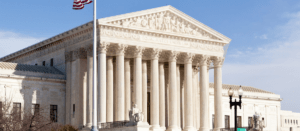The radical left and its media enablers are going berserk over the United States Supreme Court’s denial of an application for injunctive relief to stop Texas’s Heartbeat Law from going into effect. The Court simply refused to act in an activist manner and allowed the process to work as it was constitutionally envisioned.
Anyone seeking the Court to take such an extreme action that would frustrate the democratic process in this manner needs a “strong showing” that they are “likely to succeed on the merits” of the case. The pro-abortion side failed to meet that heavy burden.
Though they are fixated on Roe v. Wade, this case presents “complex and novel antecedent procedural questions on which they have not carried their burden.”
To put it simply, the Texas law is not being enforced by state officials, which the pro-abortion side is used to suing in their official capacity, given the fact that they are usually charged with enforcing the law. Not here. This law does not charge any agency or official with its enforcement. Instead, it gives private citizens the right to sue if the law is violated in the future.
The Court then, making no judgment on merits of the case, has refused to enjoin the law (meaning stopping it from going into effect) until there is an actual case or controversy with a proper defendant in order for the courts to assess it in the proper context.
The Court concluded: “This order is not based on any conclusion about the constitutionality of Texas’s law, and in no way limits other procedurally proper challenges to the Texas law, including in Texas state courts.”
Such limited action shows the Court is acting under the sort of judicial restraint envisioned by the constitutional structure, instead of as a super legislature constantly interfering and frustrating the democratic process.
It is discouraging that Chief Justice Roberts joined Justices Breyer, Sotomayor, and Kagan to dissent from the decision. The Chief Justice recognizes the complex nature of the procedural question presented, saying, “We are at this point asked to resolve these novel questions—at least preliminarily—in the first instance, in the course of two days, without the benefit of consideration by the District Court or Court of Appeals.” But he would actually enjoin the law, frustrating the will of the millions of Texans who helped enact it. This fits a pattern we have seen from the Chief Justice before, where he seems to worry about public opinion in an unhealthy way, taking steps in every major case to protect what he perceives as the “legitimacy” and independence of the Court.
Not surprisingly, the liberal side of the Court, Justices Breyer, Sotomayor, and Kagan, wrote separately, eager to project that they are ready to act on behalf of the pro-abortion side. No need for them to worry about the legitimacy of the Court. That seems to always cut one way.
We are thankful for Justices Thomas, Alito, Gorsuch, Kavanaugh and Barrett for their unwavering commitment to the law and showing the proper judicial restraint in such a politically charged area of law. That’s where it counts.






